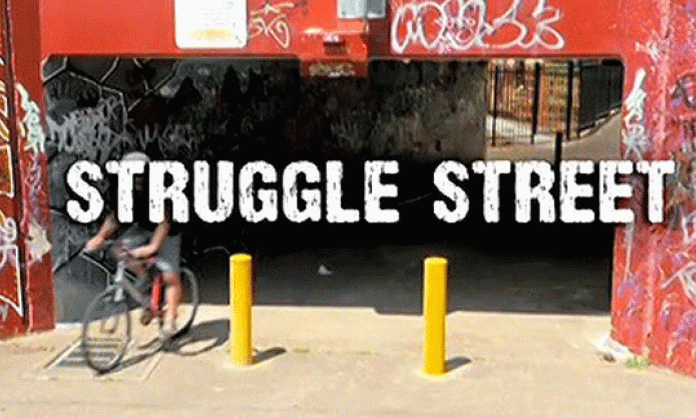Drug and alcohol use, swearing, violence and, yes, even farting. They happen all over Sydney, yet Mount Druitt specifically is now famous for all of it. This isn’t an accident. Those who dominate public discourse love a spot of poor-people bashing.
Whether it’s the media exposing the secret life of Centrelink cheats, politicians lecturing about welfare dependency or pearls of wisdom from our mining overlords about how we could all be rich too – if only we’d stop smoking and drinking (long enough to inherit an empire, right Gina?) – whatever form it comes in, the message is the same. Rather than challenging this narrative, the trailer for the SBS documentary Struggle Street confirmed it. It was a crude exercise in slapping together the most unflattering footage in pursuit of maximum ratings. That’s why the show sparked so much anger before it had even aired. It appeared to be the most infuriating combination of sensationalism and sneering elitism.
The trailer created a zoo-like spectacle for consumption by audiences who are at once frightened by the violent bogans – glad they don’t have to live anywhere near those dirty, farting circus freaks – and validated in their belief that the poor are to blame for their station in life, what with all their boozing and drug taking.
I’ve lived in the western suburbs my whole life, mostly in Blacktown, which is not far from Mount Druitt. I know I don’t speak only for myself when I say that I am sick of western Sydney being shown this way. It’s no wonder that many people didn’t wait to give the show a chance – including some of its participants, who joined protests before it aired.
But since it has been shown, Struggle Street has divided opinion. Formerly fierce opponents have softened. I am one of them. After I saw the first episode, I was relieved: glad that it wasn’t a full frontal attack on working class people whose struggles I recognise and identify closely with, glad that it wasn’t another fucking episode of Housos. (Thanks a lot to SBS for that show too, by the way.)
But now I’m angry again. Because even though the show was vastly different to the advertisement, there’s still a hell of a lot wrong with it.
Many who have changed their minds about Struggle Street now say that it is a humanising and sympathetic portrayal of ordinary people doing it tough and trying to get by. As much as these may have been the noble intentions of the creators of the show, at times they come up terribly short.
Why did we need so many subtitles for the subjects, but not for the narrator who was obviously trying to affect some blokey working class accent? And why was so much time dedicated to drugs, smoking, alcohol, violence and family dysfunction – all the things the poor are constantly attacked for?
Where’s the documentary series about all these things when they happen on the northern beaches, or the one about the successive attacks on welfare and the consequences of that? Sure, the first episode made mention of government cuts, but herein lies the problem with “starting a conversation” about poverty without actually looking at where it comes from. You might generate pity, maybe even empathy, for the poor. But the inequality remains.




